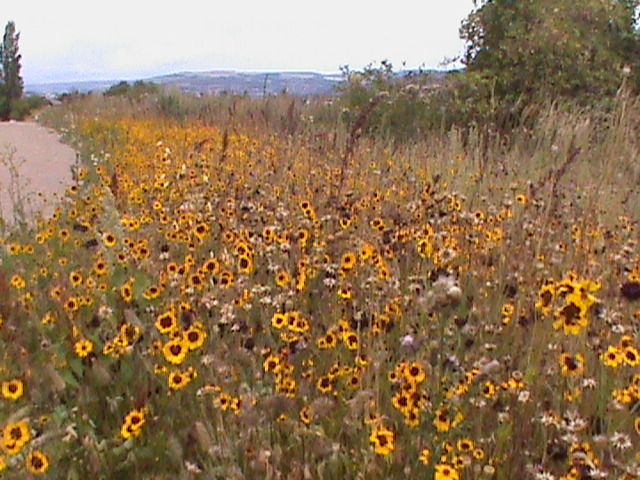 Green Estate, a local enterprise, has lost the contract for recycling the city’s green waste – prompting concerns that small, local businesses are missing out in the awarding of recycling contracts.
Green Estate, a local enterprise, has lost the contract for recycling the city’s green waste – prompting concerns that small, local businesses are missing out in the awarding of recycling contracts.
Green Estate is a non-profit making venture based in Manor Lane. It has been collecting grass and privet cuttings and branches from gardens and parks for five years, turning them into compost for gardens and landscaping. It has also been responsible for creating many of the wild flower meadows we see across the city such as this one at Manor Lodge. Now it has lost out to in the latest tendering process. Veiolia claim that Green Estates are too expensive, so have given the green waste contract to a Rotherham firm, that is a subsidiary of Veolia.
The decision is a blow to Green Estate, which combines commercial activities with projects to help tackle social, economic and environmental issues. The Sheffield Star quoted Chief Exec Sue France as saying “It was certainly a disappointment. It doesn’t bode well for small niche businesses in winning contracts.”
The Greens think recycling should be carried out as locally as possible, preventing emissions from long journies and promoting jobs and profits in the local economy. Instead the contracts are going to big firms which can undercut existing local providers.
 Coun Jillian Creasy said: “If there is any silver lining to fortnightly black bin collections, it is that recycling rates should improve. But this will only happen if recycling services are expanded and well run. We want the council to be much more pro-active in getting local businesses involved in collecting and processing recyclable materials. As resources become scarcer, the value of materials is rising and we want the income and jobs to stay in the city, not be siphoned off into the profits of multinational companies like Veolia. It doesn’t make sense for green waste to be transported for processing in Rotherham or for plastics, bottles and cans to be trucked to Pontefract when they could be handled by non-profit making social enterprises here in the city. Similarly, the recycling centres could offer a much more comprehensive service to householders and businesses if there was better dialogue between the council and the front line workers who understand the potential.”
Coun Jillian Creasy said: “If there is any silver lining to fortnightly black bin collections, it is that recycling rates should improve. But this will only happen if recycling services are expanded and well run. We want the council to be much more pro-active in getting local businesses involved in collecting and processing recyclable materials. As resources become scarcer, the value of materials is rising and we want the income and jobs to stay in the city, not be siphoned off into the profits of multinational companies like Veolia. It doesn’t make sense for green waste to be transported for processing in Rotherham or for plastics, bottles and cans to be trucked to Pontefract when they could be handled by non-profit making social enterprises here in the city. Similarly, the recycling centres could offer a much more comprehensive service to householders and businesses if there was better dialogue between the council and the front line workers who understand the potential.”
The council should be pushing Veolia to take into account the value of keeping jobs and profits local and of supporting projects which fit with other strategic plans. The council must take their responsibilities to local businesses seriously.

Didn’t all Green Waste ought to be collected in the same way that paper and glass is? Many of us like to recycle but aren’t keen enough gardeners to run compost heaps. What happened to the idea of setting up an Anaerobic Generator on the old Tinsley Twin Towers Site? That could have used Green Waste and Food waste from homes, restaurants and other businesses to generate electricity? I understand Rotherham already has, or is going to have one of these. There was a TV Programme some time ago about a schemev like this in Ludlow I think which seemed to run very well?
Yes – we should certainly be recycling garden waste and food waste too. Sending them to the incinerator at least reclaims energy by burning them (the Bernard Rd incinerator powers a district heating network and uses any excess heat to make electricity, so it’s actually a kind of biomass plant). But anaerobic digestion produces gas which can be used for vehicle fuel or to generate electricity AND leaves a nitrogen-rich residue which can be used as a fertiliser. The council IS looking at plans to build an anaerobic digestion plant (or rather, to encourage a private company to do so). Initially this would probably take food waste from the food industry or large organisations like hospitals or universities because it needs a regular, reliable source. But it could be combined with green waste processing (possibly using the residue to enrich compost) and would open the way for a household food waste collection. This is probably the single thing which would make the alternate week collections more acceptable. Having said all that, we do have to question the amount of food “waste” in an era where the price of food is rising and food shortages threaten; and to think about the barriers to local composting. I agree its not easy in a small garden or yard, but there are techniques. I put all my food waste – including cooked leftovers and dairy/meat – into a worm bin which keeps out vermin and rots down quickly. I wouldn’t dream of giving away such valuable garden nutrients! But I couldn’t deal with woody cuttings without a shredder and an allotment nearby.